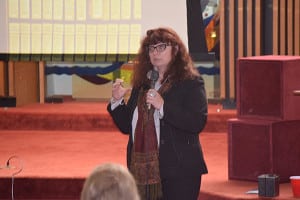 “You don’t see any tears but they are inside.” Happy tears that is. That’s what one thankful man said when Dr. Diane Afoumado found his original birth certificate from the concentration camp where he was born.
“You don’t see any tears but they are inside.” Happy tears that is. That’s what one thankful man said when Dr. Diane Afoumado found his original birth certificate from the concentration camp where he was born.
Every day, every second she’s at work, Afoumado is investigating, piecing together lives. Scribbled names line prisoner cards in black ink and fill death lists. Every day, solemn and heartbroken faces glare back at her from photographs. She scours camp lists, grave locations, immigration questionnaires and more.
Afoumado, chief of research and reference of the Holocaust Survivors and Victims Resource Center, spoke about her job at the United States Holocaust Memorial Museum during the weekly Chavurat Shalom meeting at the Temple on Thursday, May 12.
Dozens of community members gathered to hear how Afoumado’s job is unlike any “normal” job. She spends hours meticulously tracing the documents of Holocaust victims and getting them back to their families. Of course, the thank you tears are all a part of the process. But for Afoumado, her work is a passion and sifting through thousands of documents is all worthwhile.
“It’s rewarding to be able to say that I’ve helped bring closure to a family every day. My coworkers and I don’t leave any stone unturned,” Afoumado said.
The Holocaust Survivors and Victim’s Resource Center ensures that the individual experiences of survivors and victims of the Holocaust and Nazi-era persecution are collected, preserved and disseminated for future generations.
A native of Paris and cousin to Louisvillian Leon Wahba, Afoumado spoke about the Holocaust tracing process. She and her team search over 190 million scanned archived pages using the International Tracing Service database, to find matches of victims and survivors for families.
“We have people contact us every day searching for information on their family members who might have been victims of the Holocaust,” she said. A name, possible birth year and birthplace can help locate hundreds of documents about a family. Afoumado said that for many families, the pictures of their ancestors are the last ever taken.
Since opening in December 2007, the Resource Center has had over 24,000 requests and found information for 88 percent of them. Once the scanned documents are located, Afoumado emails them back to family members and then, well, the thank yous pour in.
“We don’t usually get to see the effect we have on families because we are doing everything via email. But I always save them and give them to our team,” Afoumado said.
Scanning, picking and reading isn’t the hard part of her job. She said what hurts the most is when her team can’t find family information in the database.
“Where did she go when she wasn’t allowed in to the U.S.? Maybe she tried again, maybe she didn’t,” Afoumado said. “This is archival material. Sometimes we don’t get the complete story.”
Even if she can get a small piece of information, she is pleased.
For long-time Chavurat Shalom member Irene Zahler, Afoumado’s program was a program she could not miss.
Zahler, 90, kept a sweet smile, joking with other Chavurat Shalom ladies, a subtle Bronx accent evident in between laughs. But when asked why she felt she needed to come to Dr. Afoumado’s program, Zahler quieted and set aside her fruit cup.
She said this program touched her on a personal. Her disabled aunt was a victim of the Holocaust.
“My parents had to leave Russia swiftly. They couldn’t take her, they couldn’t even say goodbye to her,” she said. “With Dr. Afoumado’s program, I don’t think you can hear about the Holocaust enough.
“To find out the places where families’ ancestors died means they might be able to trace back belongings. It would be amazing to gather old rugs, silverware and paintings and get them back in the hands of their families,” Zahler said.Or maybe just to bring closure.
With Afoumado and her team’s help, families are able to get that closure on over 60 years of open wounds. To reconnect and retrace their lineage and to give a name to their loved ones who were stripped of them.
If you’re interested in tracing back your family roots from the Holocaust or World War II-era, contact the Holocaust Survivors and Victims Resource Center at resource-center@ushmm.org or call 202-488-6130. You can also call toll free at 866-912-4385.
Chavurat Shalom is a weekly senior adult program hosted at The Temple that includes healthy lunches and programs every Thursday beginning at noon. For more information, contact Charlaine Reynolds at Charlaine.reynolds@gmail.com.
Funding for Chavurat Shalom is provided by the Jewish Community of Louisville, National Council of Jewish Women, a Jewish Heritage Fund for Excellence grant, The Temple’s Men of Reform Judaism and Women of Reform Judaism, and many other generous donors.



